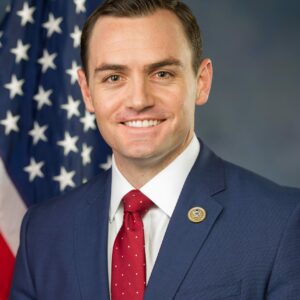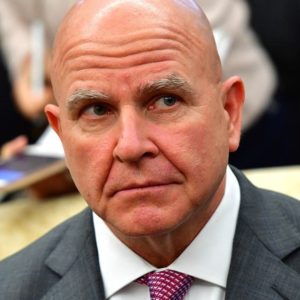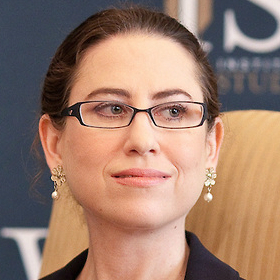Introduction to Classical Geopolitics
Apply the insights of classical geopolitical analysis to America's actions today.
June 14–July 18, 2026
Washington, DC
Security Studies offer fellows an intensive learning experience focused on the most difficult national security challenges facing the United States today. Each seminar will provide a practitioner’s view of national security, led by faculty who have direct experience forming and advising U.S. foreign policy.
Our five-week program will give fellows a comprehensive understanding of grand strategy, exploring the themes of power, geography, and greatness. Fellows will take courses dedicated to three of the most important theaters to the United States—Europe, East Asia, and the Middle East—along with an introduction to geopolitical theory and a close reading of a strategic text. Fellows will also participate in simulations and case studies, concluding with a capstone exercise incorporating written and oral components.
All fellows will have the opportunity to hear from senior policymakers and national security experts. Past guest lecturers include Senator Tom Cotton, strategist Jacqueline Deal, former CENTCOM Commander Kenneth McKenzie, former Secretary of State Mike Pompeo, former NSC director Rush Doshi, and Palantir head of defense Mike Gallagher.
How do you think like a policymaker?
This fellowship is a full-time commitment. Fellows should expect to spend the morning in seminar; afternoons and some evenings will be devoted to guest speaker sessions and other class activities. Up to 16 fellows will be accepted to the Security Studies Program. All fellows receive residential accommodations, books and course materials, and a $2,500 stipend to offset travel and living expenses.
Who Should Apply? Advanced undergraduates, recent graduates, and young professionals under 35 are all eligible to apply. Up to 16 fellows will be selected.
Dates & Times: The Security Studies fellowship meets in-person in Washington, DC for five weeks of morning seminars, with afternoon guest speakers and some evening activities. Fellows are expected to attend all sessions and activities.
Housing, Stipend, & Course Materials: All fellows receive residential accommodations and a $2,500 stipend to offset travel and living expenses. All fellows receive books and course materials.
Deadline: Deadline: Applicants who apply by the Early Decision deadline (01/20/26) will receive priority consideration. Early Decision applicants are expected to participate in the fellowship if admitted and to withdraw applications from other opportunities. If not admitted in the Early Decision round, applicants may defer to Final Decision to be reviewed again.
The Final Decision deadline is February 24, 2026.
Describe, in 1,000 words, or less the political questions you find most interesting, your future ambitions, and how these relate to your preferred program(s).
Unofficial; required only for currently enrolled students & recent graduates.
12 pages maximum; double-spaced. Please send academic writing that best showcases your ability to invent and sustain a persuasive argument, no matter the subject-matter.
Standard applicants will submit one letter of recommendation. Nominated applicants will submit two references & contact info.


Litigation Associate, Sullivan & Cromwell LLP
Data Manager, Chicago Project on Security and Threats
University of Chicago | Georgetown Law Center
Jakob Urda is an alum of the War Studies Program, and has since returned for subsequent Hertog programs as a young professional. After a course with Dan Blumenthal, he and Dan worked together to research and write an essay on China’s economic and military power. Jakob is now an associate at Sullivan & Cromwell.
One of my professors at the University of Chicago, Robert Pape, recommended I apply to the War Studies program. The University of Chicago Scholarship Office said that based on my interests in great power politics and political thought that the War Studies program would be a strong fit.
Subsequently, I participated in the Hertog Seminar on “Nixon in China” and the Security and Strategy Seminar Series on China. I have also attended War Studies Advanced Courses such as “Civil Military Relations” and “Russian Hybrid Warfare.” I could not have asked for a better experience in these programs. They pushed me to develop the rigor of my ideas and built my personal network of like-minded young professionals.
I studied political science at the University of Chicago with a special focus on the foreign policy strategy of the late Hapsburg monarchy. One of my most formative experiences was being sent to the NATO Center of Excellence Defense Against Terrorism as an instructor for a weeklong program to bring social science research into the discussion with security practitioners. It convinced me that I want to continue to operate at the nexus of research and security.
Hertog programs have been instrumental in my professional development. The War Studies and China programs sharpened my ambitions and gave me analytical tools to succeed in my work and school environments.
The War Studies Program took me beyond being a foreign policy hobbyist. The War Studies Program conducts a holistic discussion of the strategic, operational, and tactical levels of war. From close readings of theory of war to simulated debates over post-war doctrinal evolution, students leave with a deeper understanding of the concepts at work.
What most stood out to me was the War Studies instructors’ uncompromising approach to intellectual honesty. Every idea would be subject to intense scrutiny and every theory would be applied to unusual and difficult test cases. We discussed what Clausewitz would say about the Gulf War air campaign or the Russian Deep Battle doctrine. In subsequent experiences in school and work, I have had to work with similar frameworks and I always go back to the approaches taught in the War Studies Program.
The Hertog programs have helped more than anything else to keep me sharp and critical. It is all too easy to slip into comfortable opinions and routines, but the Hertog classes consistently force me to engage with new and diverging viewpoints and push me out of my comfort zone. The ability to engage with such an intelligent student body on such important issues is unparalleled.
Absolutely. My impression is that while many people are nominally interested in foreign policy and security studies issues, they are limited by resources which only scrape the surface. Hertog programs are unique in their ability to drive students deeper into these important topics.
The “Nixon and China” class I took under Dan Blumenthal is a great example of Hertog’s value. Instead of laying out a single viewpoint about a difficult issue, the class used a primary-source focus which forced students to develop their own opinions. Reading documents such as Kissinger’s transcripts and Nixon’s op-eds makes clear the enormous complexity of the decisions involved. For a generation of young people interested in participating in similarly momentous challenges, this is an invaluable experience.
I want blend my security studies and technology policy backgrounds to work on America’s technology competition with China. One lesson that Hertog teaches you is that competition has many faces and changes form throughout history. Today, it seems that technology competition will be a key foreign policy issue which spans political, economic, and military domains. I would like to work for a US government body such as CFIUS, BIS, or OSTP to help America design a technology strategy which protects our core national interests.
Jakob Urda is an alum of the War Studies Program, and has since returned for subsequent Hertog programs as a young professional. After a course with Dan Blumenthal, he and Dan worked together to research and write an essay on China’s economic and military power. Jakob is now an associate at Sullivan & Cromwell.
The “Nixon and China” class I took under Dan Blumenthal is a great example of Hertog’s value. Instead of laying out a single viewpoint about a difficult issue, the class used a primary-source focus which forced students to develop their own opinions. Reading documents such as Kissinger’s transcripts and Nixon’s op-eds makes clear the enormous complexity of the decisions involved. For a generation of young people interested in participating in similarly momentous challenges, this is an invaluable experience.

Aaron MacLean
Aaron MacLean is a senior fellow at Hudson Institute and the host of the School of War podcast. Previously, he was senior foreign policy advisor and legislative director to Senator Tom Cotton of Arkansas. Aaron served on active duty as a U.S. Marine for seven years, deploying to Afghanistan as an infantry officer in 2009–2010.

Vance Serchuk
Vance Serchuk is Executive Director of the KKR Global Institute and an Adjunct Senior Fellow at the Center for a New American Security. Prior to joining KKR, Mr. Serchuk served for six years as the senior national security advisor to Senator Joseph Lieberman (I-Connecticut).

Michael Doran
Michael Doran, an expert in U.S. policy toward the Middle East, radical Islam, and the Arab- Israeli conflict, is a Senior Fellow at the Hudson Institute in Washington, DC. He has also held a number of senior U.S. government posts related to Middle East policy and strategic communication.

Daniel Blumenthal
Dan Blumenthal is a senior fellow at the American Enterprise Institute, where he focuses on East Asian security issues and Sino-American relations. Mr. Blumenthal has served in and advised the US government on China issues for more than a decade.

Hugh Liebert

Mike Gallagher
Mike Gallagher served for four terms in the U.S. House of Representatives as Wisconsin’s 8th Congressional District representative. Previously, he served seven years on active duty in the U.S. Marine Corps, including two deployments to Iraq.

Gen. Kenneth F. McKenzie Jr.
Gen. Kenneth ‘Frank’ McKenzie Jr. is the former Commander of United States Central Command. He led a distinguished 42-year military career, commanding at multiple levels within the Marine Corps and serving on the Joint Staff. His leadership roles included commanding the First Battalion, Sixth Marines, and the 22nd MEU (SOC) during combat deployments to Afghanistan and Iraq.

Dan Blumenthal
Dan Blumenthal is a senior fellow at the American Enterprise Institute, where he focuses on East Asian security issues and Sino-American relations. Mr. Blumenthal has served in and advised the US government on China issues for more than a decade.

Jeremy Furchtgott
Jeremy Furchtgott is Director at Baron, a firm dedicated to providing U.S. private-sector as well as U.S. government clients with insights needed to prevail in strategic competition. In addition to serving as a member of the firm’s management team, he leads Baron’s China practice.

Elbridge Colby
Elbridge Colby is co-founder and principal of The Marathon Initiative, a policy initiative focused on developing strategies to prepare the United States for an era of sustained great power competition. He is the author of The Strategy of Denial: American Defense in an Age of Great Power Conflict (Yale University Press, 2021). Previously, Colby was from 2018-2019 the Director of the Defense Program at the Center for a New American Security, where he led the Center’s work on defense issues.

Christian Brose
Christian Brose is a Senior Fellow at the Carnegie Endowment for International Peace and the Head of Strategy at Anduril Industries, prior to which he served as staff director of the Senate Armed Services Committee. He was also responsible for leading the production, negotiation, and passage of four National Defense Authorization Acts, which set policy and authorized spending for all U.S. national defense activities.

Matthew Kroenig
Matthew Kroenig is a Professor in the Department of Government and the Edmund A. Walsh School of Foreign Service at Georgetown University. A 2019 study in Perspectives on Politics ranked him as one of the top 25 most-cited political scientists of his generation. He has served in several positions in the U.S. Department of Defense and the intelligence community in the Bush and Obama administrations.

H.R. McMaster
H. R. McMaster is the Fouad and Michelle Ajami Senior Fellow at the Hoover Institution, Stanford University. Previously, he served as the 26th assistant to the president for National Security Affairs and as a commissioned officer in the United States Army for 34 years before retiring as a Lieutenant General. He is author of Battlegrounds: The Fight to Defend the Free World.

Eric Brown
Eric Brown is a Senior Research Scientist at the College of William & Mary’s Global Research Institute, where he is developing research and educational programs on world politics, applied history, and security. Prior to joining GRI in 2022, Brown was a senior fellow at Hudson Institute.

Nataliya Bugayova
Nataliya Bugayova is a Research Fellow at the Institute for the Study of War (ISW), where she leads the Russia and Ukraine portfolio. Her work focuses on the Kremlin’s foreign policy decision-making and ongoing global campaigns. Prior to ISW, she was the Chief Executive Officer of the Kyiv Post, Ukraine’s independent English-language publication.

James M. Dubik
LTG James M. Dubik (U.S. Army, Ret.) is a Senior Fellow at the Institute for the Study of War and a Professor at Georgetown University’s Security Studies Program. General Dubik has extensive operational experience in Iraq, Afghanistan, Japan, Korea, Thailand, Bosnia, Haiti, Panama, and in many NATO countries.

Frederick W. Kagan
Frederick W. Kagan is a Senior Instructor with the Hertog War Studies Program at the Institute for the Study of War. The author of the 2007 report “Choosing Victory: A Plan for Success in Iraq,” he is one of the intellectual architects of the successful “surge” strategy in Iraq. He is the director of AEI’s Critical Threats Project.

Kimberly Kagan
Kimberly Kagan is a Senior Instructor with the Hertog War Studies Program and founder and president of the Institute for the Study of War. She is a military historian who has taught at the U.S. Military Academy at West Point, Yale, Georgetown, and American University.
Vance Serchuk
Vance Serchuk is Executive Director of the KKR Global Institute and an Adjunct Senior Fellow at the Center for a New American Security. Prior to joining KKR, Mr. Serchuk served for six years as the senior national security advisor to Senator Joseph Lieberman (I-Connecticut).

Lewis Libby
Lewis “Scooter” Libby is a distinguished fellow at the Foundation for Defense of Democracies. He has held several high level positions in the federal government related to his current work on national security and homeland security affairs. This included roughly a dozen years working in the White House, the U.S. Department of Defense, and the U.S. Department of State.
Paul Wolfowitz
Paul Wolfowitz is a scholar at the American Enterprise Institute. He spent more than three decades in public service and higher education. Most recently, he served as president of the World Bank and deputy secretary of defense.

William Inboden
William Inboden is Executive Director and William Powers, Jr. Chair at the Clements Center for National Security at the University of Texas-Austin. Previously he served as Senior Director for Strategic Planning on the National Security Council at the White House.

Steven F. Hayward
Steven F. Hayward is a senior resident scholar at the Institute of Governmental Studies at UC Berkeley, Senior Fellow of the Claremont Institute, and a visiting lecturer at Boalt Hall Law School. Hayward is the author of a two-volume narrative history of Ronald Reagan and his effect on American political life, The Age of Reagan: The Fall of the Old Liberal Order, 1964-1980, and The Age of Reagan: The Conservative Counter-Revolution, 1980-1989.

Daniel Johnson
Daniel Johnson is an author, journalist, and founding editor of Standpoint, a monthly British cultural and political magazine. He is the author of White King and Red Queen: How the Cold War was Fought on the Chessboard.

Andrew Roberts
Andrew Roberts is presently a Visiting Professor at the War Studies Department at King’s College, London and the Lehrman Institute Lecturer at the New-York Historical Society. He is the author or editor of numerous books, including Masters and Commanders, which won the Emery Reves Award of the International Churchill Society and was shortlisted for The Duke of Westminster’s Gold Medal for Military History and The British Army Military Book Award. He is presently writing a biography of Sir Winston Churchill.

Samuel Garrett Zeitlin
Samuel Zeitlin is Lecturer in Modern Intellectual History at University College London, specializing in political thought, international relations, and the history of philosophy.

Patrick Coleman
Patrick Coleman is a Tutor at St. John’s College. He earned his Ph.D. in Physics from University of Illinois, Urbana-Champaign, with a dissertation on synchronization, and his B.S. in Physics from William & Mary College along with a minor in Philosophy. He is currently leading a research group on the integration of a Technology and Computation segment in St. John’s College’s Graduate Institute. Patrick has led seminars and reading groups for The Catherine Project, including a recent reading group on Richard Feynman’s Lectures on Computation, and is especially devoted to deepening scientific literacy.

Gregory McBrayer
Greg McBrayer is Interim Provost at Ashland University and a political science professor specializing in political philosophy and international relations. He has published widely, co-authored and edited works on Plato and Xenophon, and previously held positions at Morehead State, Emory, and Gettysburg College.

Flagg Taylor
Flagg Taylor is the Executive Director of the Center for Civics, Culture, & Society, at Miami University. His research specialty is in the history of political thought and American government, especially the question of executive power. He is Chair of the Academic Council of the Victims of Communism Memorial Foundation.